It has been twenty years since ‘Titanic’ (1997) sailed and sank its way to box office glory, a record number of Academy Award wins, made Leonardo Di Caprio a superstar, established Kate Winslet as a major actress, and launched ton of millions of wedding songs with My Heart Will Go On. After seeing the film at a press screening in late November 1997, November, and I was convinced the film would do modestly well, but nothing more. I was simply wrong, and not in any way prepared for the juggernaut it became.
James Cameron wrote a very simple screenplay, tale as old as time, a love story acted out in front of a great historical event as it is happening. ‘Gone with the Wind'(1939), ‘Cleopatra’ (1963), and ‘Dr. Zhivago’ (1965) led the way in this sort of love story though Cameron tapped into something unique with his film. While watching the film, seeing the passengers, seeing the many faces, we know many of them are doomed, but who?
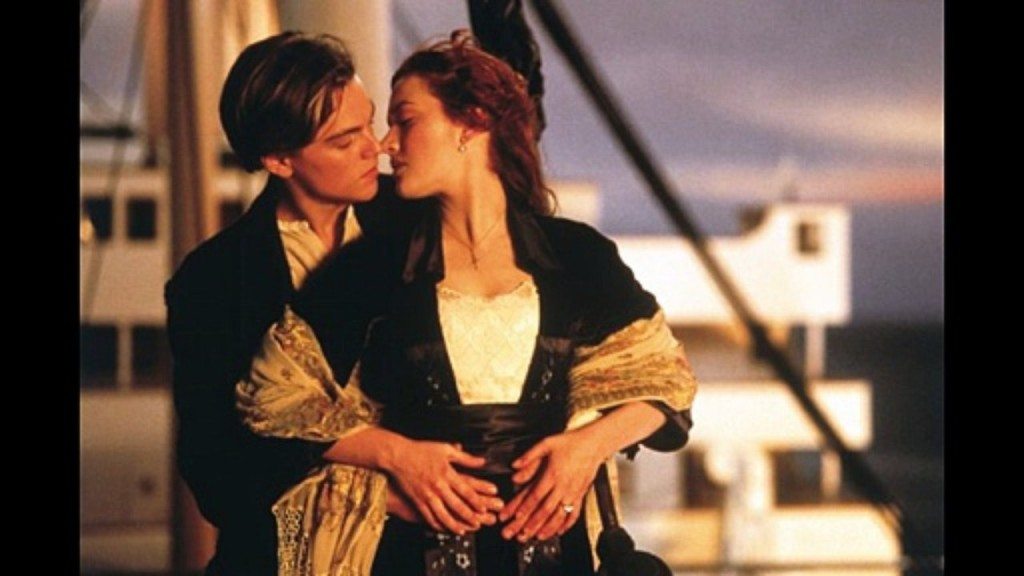
The director made several trips down the wreckage of Titanic, bringing back with him superb, ghostly images used in the film, often morphing into the ship as it was the day it set sail. They are haunting moments that stay with us long after the film has ended. While the screenplay is very simplistic, the love story almost silly, I’ll be damned if the actors did not pull if off. It is not the first time great actors have made a weak script into a fine film, but what Di Caprio and Winslet achieve here is something for the ages. You know that sensation of deep love, that sense that you cannot be without the other person, you want them all the time, you just want to be near them? Trust is inherent, longing is real, you are as vulnerable as you can possibly be with another human being? That is how they make us feel, that is the love they portray. All consuming, all-encompassing, soul mates from very nearly the beginning.
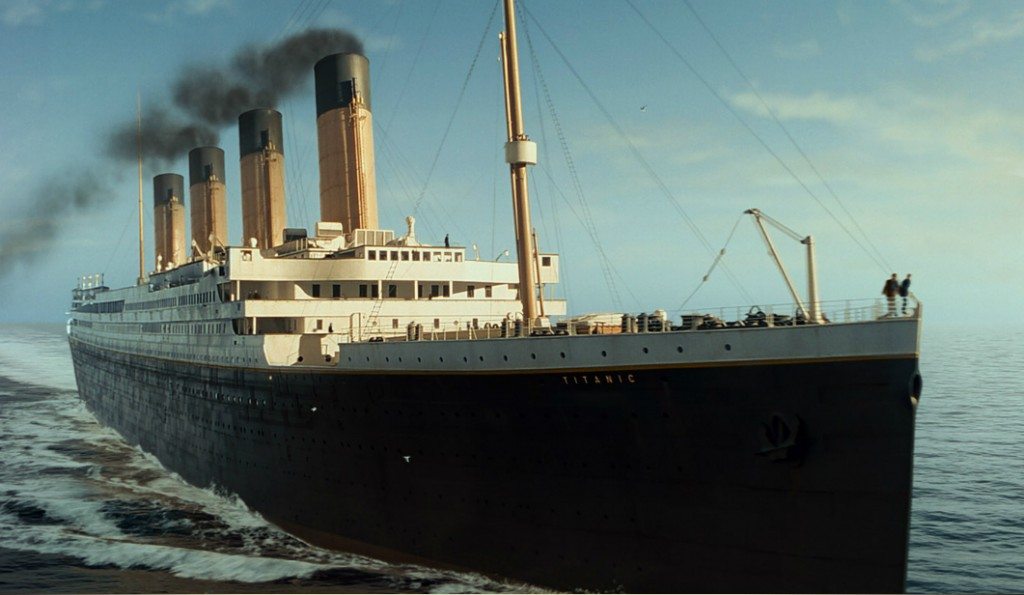
Rose (Winslet) is being married off to Cal (Billy Zane), an entitled, pompous, spoiled brat whom she loathes. To not marry him would mean a life of servitude for her mother, a snob without really the means to be such. Saved by Jack (Di Caprio) from a suicide attempt, the pair forge an unlikely friendship, though he cannot understand why she would marry such a boob, and she admires his bohemian existence.
Of course they fall in love, much to the chagrin of the very nasty Cal. One the very night Jack and Rose make passionate love in a car in holding, the great ship strikes the iceberg that was there waiting for them. From that point in the film, the events unfold in real-time, with a mounting sense of terror of the icy cold slow death awaiting those who are not placed in lifeboats.
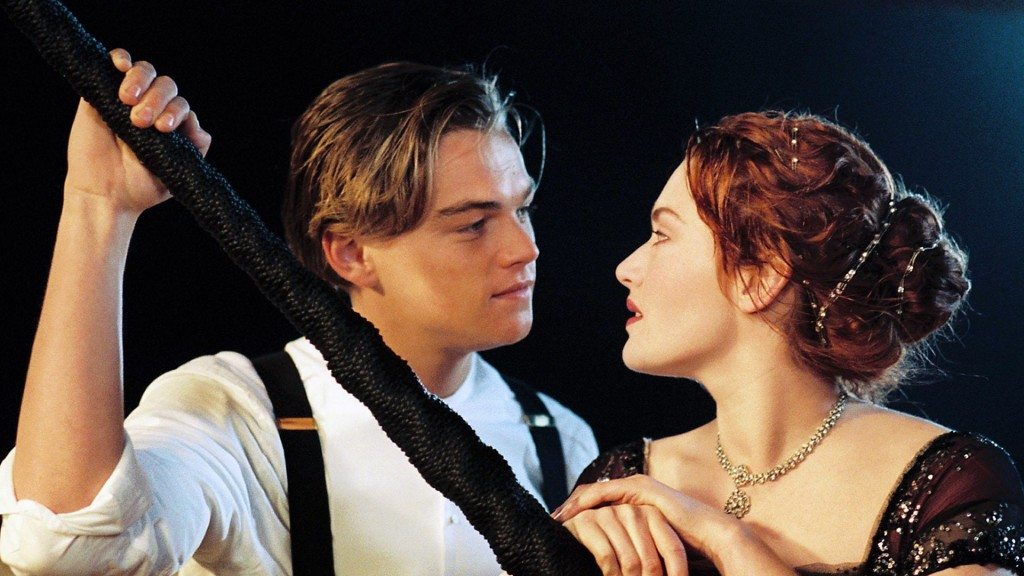
The visual effects in the film are brilliant, the sinking of the great ship a startling marvel of cinematic magic, but even with those stunning effects, it remains the performances and images that sell it. A mother praying in her bed holding her children close as the freezing water fills their room, death certain. The fear on the faces of the wealthy men, brandy in hand as they sit waiting, waiting for hell to be unleashed in the shape of water so cold it hurts.
Through all this, Jack and Rose seek to outfox her mother and Cal, who will buy his way eventually onto a life boat, leaving the woman he loves to perish. But of course she does nothing of the kind. Her will to live is ferocious, and (spoiler) though Jack dies after saving her, she dedicates her life doing the things they were going to do together. The film is framed with a search for Titanic by a salvage crew who think they know about the famous jewel Cal gave to Rose as a token of his affection. As far as anyone knows, the jewel went down with the ship. However Rose found it in her coat pocket after being rescued and carries it with her when she goes to the ship. It is there we hear her story, told by a plus one hundred Rose, portrayed by Hollywood pioneer Gloria Stuart in a lovely performance. Rose will pass away on the ship, miles above Jacks resting place, surrounded by her photographs which celebrate the life she led in honouring him, she joins him in front of the clock on the ship. Forever young, forever together.
The dialogue is hokey and weak, often downright silly, but the actors, all of them make it work. Victor Garber is excellent as the unsinkable ship’s builder, Kathy Bates is furiously energetic as Molly Brown, David Warner a devious menace as Cal’s “man” or bodyguard, and Billy Zane oily viciousness as Cal.
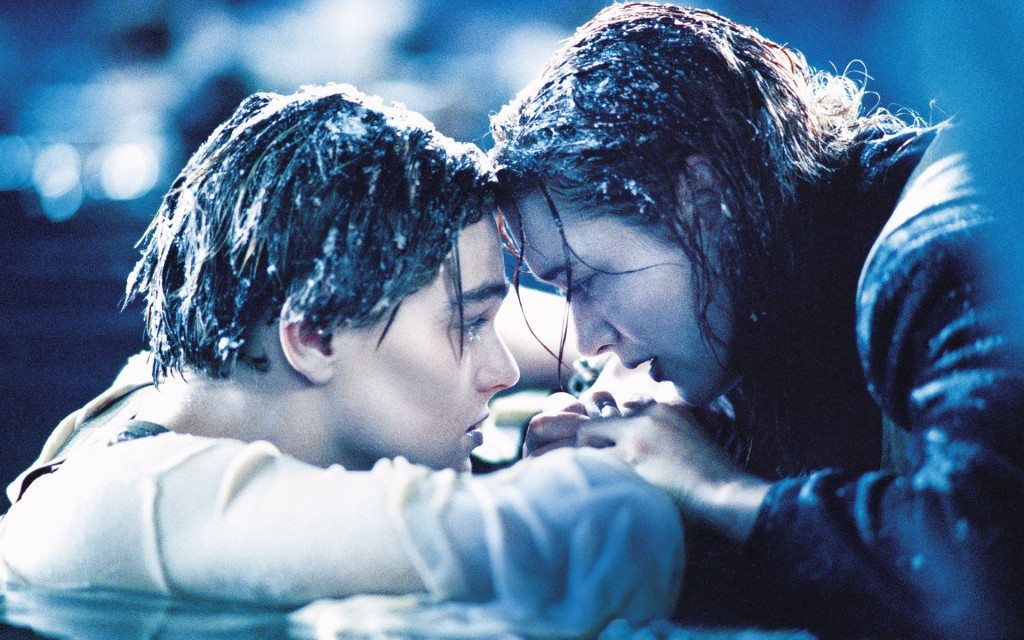
But it is the explosive chemistry between Di Caprio and Winslet that carry the film, and oh that every love story have the heat these two had. So many love stories on film have no chemistry, this one has napalm explosive chemistry and despite often silly dialogue, they give the film life, they bring the characters to vivid life. Neither has a false note in their performance, each is splendid.
The film opened to decent reviews, no one hated the film, but neither was it topping ten best lists. Yet Hollywood was watching and saw in the film a chance for the studios to remind the public they could still make great films. The year previous, just one of the five nominees for Best Picture was made by a major studio, something which terrified the Academy. ‘The English Patient’ (1996), produced by indie leader Miramax would win the Academy Awards, making it clear that Hollywood needed an overhaul with the films they were making.
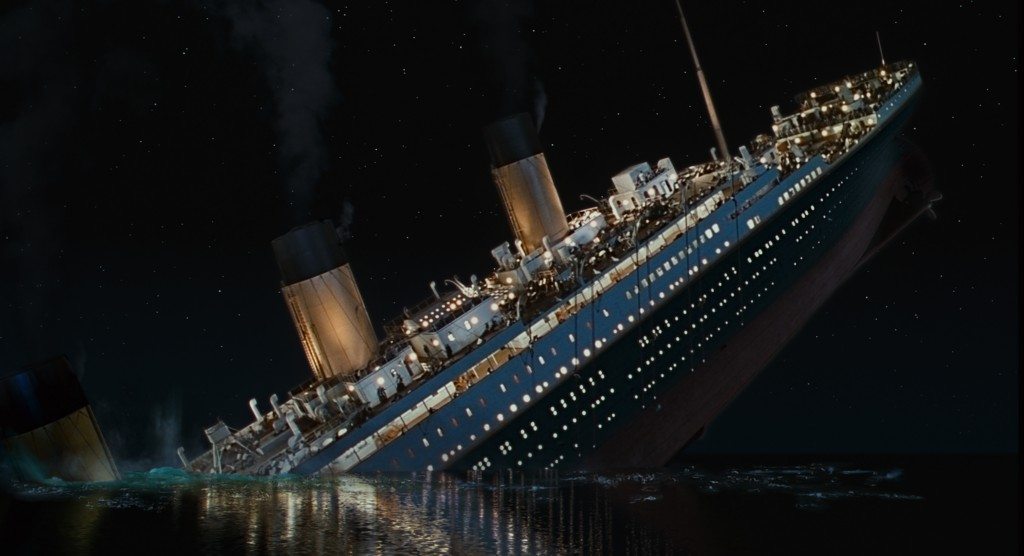
‘Titanic’ (1997) was nominated for a whopping fourteen Academy Awards tying the record set by ‘All About Eve’ (1950), though there were howls and screams of protest when Di Caprio was not nominated. Winslet and Stuart were both nominated, and it was felt without Di Caprio the film would not have worked. Though the Best Actor category was loaded with potential nominees that year, there was a strong argument for Di Caprio making the list, but alas he did not.
The film won no major critics awards in the weeks leading up to the Oscars, as the superb crime noir ‘LA Confidential’ (1997) won Best Film and Best Director awards from the critics circles of Los Angeles and New York and the National Society of Film Critics, and the film was nominated for nine Academy Awards. When James Cameron won the Directors Guild of America for Best Director, and the film won the Golden Globe for Best Drama, it seemed clear sailing at the Oscars. It was by then a box office behemoth, and come Oscar night tied ‘Ben Hur’ (1959) with eleven Academy Awards.
While I have no argument with many of the awards, I have never, ever believed the film was the best of its year or that Cameron should have won Best Director. That said, the awards for cinematography, production design, costumes, visual effects, sound, song and score were each well deserved. The haunting score of the film is easily one of the finest ever composed, perfectly in tune to the films tragedy, sadness and the manner in which it haunts each of us.
‘LA Confidential’ (1997) or ‘The Sweet Hereafter’ (1997) were each far more deserving winners of the top prize, but the Academy was on a mission to prove Hollywood still made great movies. The enormous risks of Titanic (1997) escaped no one, it took two studios, Paramount and Fox to produce it, and had it failed would have placed them in terrible peril. There was genuine concern leading up to the release of the film, and extraordinary pressure on Cameron, but once the film was out there it became apparent it was a box office juggernaut headed for greatness, despite the inherent weaknesses in the film.
Twenty years along, it is apparent Cameron made a lasting work that was a touchstone for audiences who saw the film several times, could quote the script, knew the film by heart and to this day consider it to be their favorite film.
Is it a great film? No, but it is addictive, infectious and if on TV I find it hard to turn it off. Incredibly in the twenty years since Cameron has made a single film, ‘Avatar’ (2009) which was also a box office giant. Each has moments of grand spectacle and greatness, and each is weakened by the screenplay. Cameron got be this generation’s Cecil B. Demille, a grand showman who puts on one hell of a show.
Read More: ‘Fight Club’: Futuristic and Path-Breaking

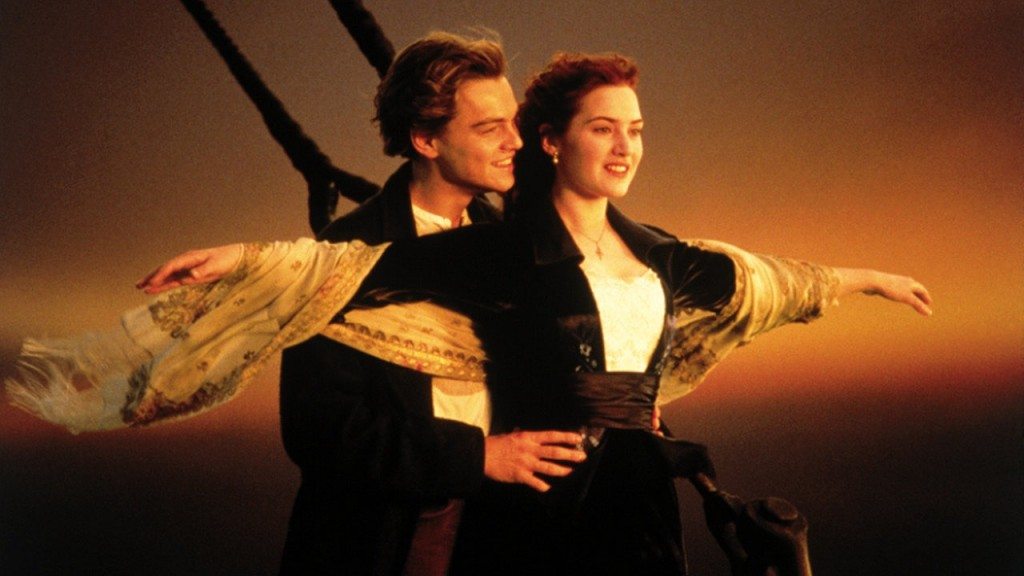
You must be logged in to post a comment.